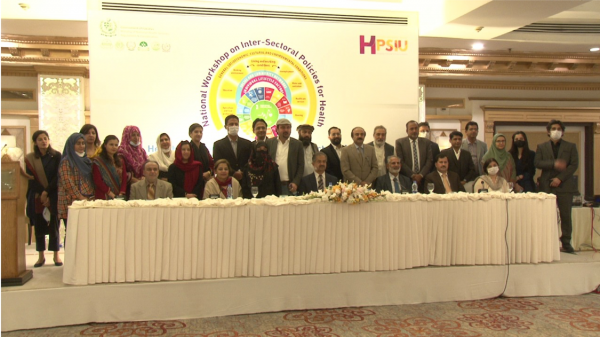ISLAMABAD, 24 February 2021 — On 23 February, the Ministry of National Health Services, Regulations and Coordination (MoNHSR&C), in collaboration with the DCP3 Secretariat at the London School of Hygiene and Tropical Medicine and World Health Organization held a national workshop on Intersectoral Policies for Health in Islamabad, Pakistan. The workshop brought together over 30 delegates from federal and provincial Health Departments, Ministry of Planning Development & Reforms, Ministry of Climate Change, Health Services Academy, and development partner organizations.
The workshop aimed at providing a brief overview of the package of high-priority intersectoral policies, reviewing the current status of these policies, discussing prioritization criteria, and developing specific recommendations for the implementation of the proposed inter-sectoral policies. The workshop featured keynote speeches from Dr Razia Safdar, Director Institutions, MoNHSR&C, Dr Nausheed Hamid, Parliamentary Secretary for Health, and Dr Safi Muhammad Malik, former DG Health MoNHSR&C. It also included presentations by national and international experts on selected topics relevant to the situation in Pakistan, including Dr Ala Alwan (DCP3 Secretariat/LSHTM), Drs Dean Jamison and Charles Mock (University of Washington), Dr Wafa Aftab (CHS-AKU), Dr Francesco Branca (WHO/HQ), Dr Ajay Pillarisetti (Emory University), and Drs Roberto Iglesias, Fatimah El-Awa and Shahzad Alam Khan (WHO/EMRO).
The workshop is part of a strategic collaboration between the DCP3 Secretariat and the Government of Pakistan to accelerate progress towards UHC through the development and implementation of a national package of high priority intersectoral policies for health. It builds on a series of meetings held in Pakistan in 2020, which resulted in the selection of 29 core intersectoral policies for early implementation in Pakistan, covering four areas, such as taxes and subsidies, regulations and related enforcement mechanisms, built environment, and information. A review of these 29 interventions was carried out by the Aga Khan University and DCP3 Secretariat, with support from WHO, and was discussed and further prioritized during the workshop’s working group sessions. Participants also explored actions needed to support the implementation of the high priority intersectoral policies.
The information and recommendations generated during the workshop will be used to update the current review document and develop a multi-sectoral strategic work plan which includes the status of prioritized intersectoral policies, level of government priority, and proposed actions. Multisectoral groups will also be created to recommend actions for endorsing and implementing the prioritized policies, and a series of workshops and high-level meetings will be organized to review progress and recommend further action.




